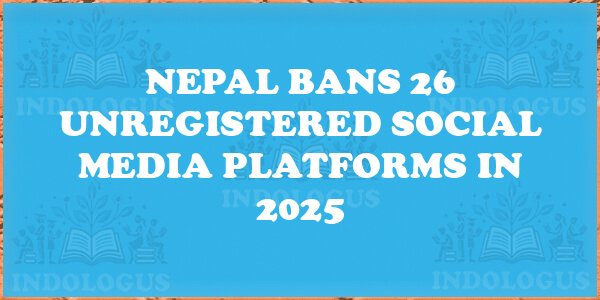The Government of Nepal has banned 26 unregistered social media platforms including Facebook, WhatsApp, Instagram, YouTube, and X from September 4, 2025. This strict enforcement ensures platforms comply with Nepal’s Directive for Regulation of Social Media Use, 2080, improving digital accountability and security for users.
What Led to Nepal’s Social Media Ban?
Nepal’s Ministry of Communications and Information Technology (MoCIT) gave a 7-day ultimatum starting August 28, 2025, requiring all social media platforms, both domestic and international, to:
- Register officially with the Ministry
- Set up a local office in Nepal
- Appoint a designated contact person for regulatory compliance
When 26 major platforms, including Facebook, WhatsApp, Instagram, YouTube, X (formerly Twitter), Viber, and Botim, failed to meet these requirements, the Nepal Telecommunications Authority (NTA) was directed to block their access within the country.
Key Platforms Affected and Exceptions
The ban affected popular platforms such as Facebook, Instagram, WhatsApp, YouTube, X, Viber, and Botim. However, there are notable exceptions:
- TikTok – Although previously banned in August 2024, TikTok is allowed to operate after officially registering in November 2024 and meeting all regulatory conditions.
- Telegram – Remains banned since July 2025 due to its alleged involvement in online fraud and money laundering activities.
Legal Backing and Implementation
The ban follows a Supreme Court of Nepal order issued during a contempt of court case, instructing the government to prevent unregistered social media platforms from operating legally. The Cabinet approved the enforcement on August 25, 2025, which led to the subsequent implementation starting September 4.
This directive aims to boost digital accountability, user protection, and control misinformation, online abuse, and cybercrimes on social media within Nepal.
Impact and Importance for Users
Social media platforms are vital for Nepalese users, especially for staying connected with family abroad. The ban mainly impacts communication apps widely used for international calls and messaging, such as WhatsApp, Botim, and Viber.
According to World Bank data (2024), remittances contributed over 33% of Nepal’s GDP, highlighting how critical digital communication remains for migrant workers and their families.
Key Takeaways for Competitive Exams
- Nepal banned 26 unregistered social media platforms on September 4, 2025.
- The ban aligns with the Directive for Regulation of Social Media Use, 2080 aimed at digital compliance and regulation.
- Major platforms banned include Facebook, WhatsApp, Instagram, YouTube, and X.
- TikTok is exempted as it registered officially in November 2024 following regulatory requirements.
- Telegram remains banned due to misuse in online fraud and money laundering.
- The action follows a Supreme Court order to enforce registration and accountability for social media platforms in Nepal.
- Understanding this ban is crucial for questions on digital regulations, internet governance, and South Asian current affairs.



